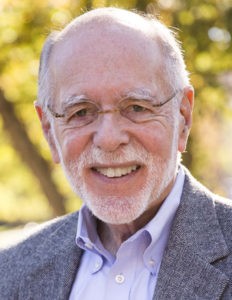In this age of alternative facts, when truth means whatever people want it to mean, I find myself longing wistfully for the Christian tradition in which I was raised — although, for the most part, it has long since passed away.
That tradition is the Church of Christ that was committed, once upon a time, to the restoration of primitive Christianity and to mining from the biblical text those truths that guided the earliest Christians.

Richard T. Hughes
One of our 19th-century forebears, an old preacher named John Rogers, stated our passion well. “We have no reason to conclude, we know all the truth … (and) we have nothing to lose in this inquiry after truth.” And so we searched high and low. We searched in the dark corners and musty crevices of the biblical text, always on the lookout for more and greater truths to guide us along our way.
Samuel S. Hill Jr., the dean of historians of religion in the American South for so many years, told me once that, in his estimation, Churches of Christ, with their commitment to search for truth in the pages of the biblical text, contributed immeasurably to the growth of literacy on the 19th-century Southern frontier.
The passion to discover biblical truth was so powerful that Churches of Christ have produced an extraordinary number of world-class biblical scholars, perhaps as many or more, per capita, than any other Christian tradition in the world. I make that claim with complete confidence in its accuracy. Many who were born in the 1930s, 1940s and 1950s and who grew up in this tradition understood that biblical truth was the pearl of great price and made the vocation of biblical scholarship the driving force of their lives.
In the spring of 2015, I traveled throughout the United States and interviewed almost 60 of these scholars. Greg Sterling, dean of Yale Divinity School, told me that his passion to grasp biblical truth was so strong that, while still in high school, he began looking up key Greek words in order to better understand the biblical text.
Jim Roberts, recently retired William Henry Green Professor of Old Testament Literature at Princeton Theological Seminary, devoured an entire set of New Testament commentaries while still in junior high school. Raised in a West Texas farming community, Roberts told me that his dad “got irritated with me because I’d take the Bible with me to the cotton field and read in between hoeing rows of cotton.”
“Growing up in Churches of Christ in west Tennessee, the Bible was ‘the water we drank and the air we breathed.’”
Carl Holladay, recently retired Charles Howard Candler Chair in New Testament Studies at Emory University’s Candler School of Theology, recalled that as a young man growing up in Churches of Christ in west Tennessee, the Bible was “the water we drank and the air we breathed.”
While I never joined the ranks of the biblical scholars, I grew up in a world like theirs, a world where the search for biblical truth was all consuming.
When I was 16 year old, growing up in San Angelo, Texas, my mother taught me a lesson I never have forgotten. I had done my best to convert my friends to our church when my mother said, “Son, you can try to convert your friends to the Church of Christ if you wish. But if you discover that they are right and you are wrong, then you must be the one who is willing to make the change.”
I recently read an essay on the morally ambiguous face that Christianity has presented to the world over the course of 20 centuries. “Christianity is the Civil Rights Movement,” the author wrote, “but it’s also the Crusades, the Inquisition, and a tradition of antisemitism on which Hitler built.”
The author concluded that Christians have no right to conclude that Donald Trump — or anyone else, for that matter — is “a bad Christian or not even Christian at all,” since there is no norm by which we might make such a judgment.
The author is correct, of course, that normative judgments are futile if we base the meaning of the Christian religion on the widely divergent ways in which Christians have behaved over the centuries.
But that is precisely the kind of argument the Churches of Christ of my youth rejected. The meaning of the Christian religion, we argued, is found in the biblical text. The text was always the norm, the plumb line, the standard by which authentic Christianity should be defined. And that high standard could accommodate neither the Crusades nor the Inquisition nor Hitler’s antisemitism nor the morally repugnant behavior of Donald J. Trump.
Admittedly, we got a lot of things wrong in the Church of Christ of my youth. We were so focused on learning and doing the truth, defined in rational terms, that we had very little sense of grace. And our focus on truth often turned us toward legalism and exclusivism.
But we longed to be authentically Christian, and our failings — although they were many — no more discredited the biblical norms of Christian faith than the failings of other committed Christians discredit the teachings of Jesus.
“First, some argued that they had found all the truth there was to be found. They had become, in effect, the one true church.”
Churches of Christ began to reject their birthright — their commitment to search for truth — in two waves. First, some argued that they had found all the truth there was to be found. They had become, in effect, the one true church. Why, then, continue the search?
Then, beginning in the 1960s, many in this tradition, disillusioned with legalism and exclusivism, turned their backs on the entire project, rejected as fundamentally flawed both the restoration vision and the passionate search for truth that vision inspired, and began to embrace the piety of popular evangelicalism, a tradition hardly known for its commitment to the life of the mind.
The commitment to search for truth still survives here and there, especially in pockets of seekers, tucked away in colleges and universities related to this tradition — Pepperdine University, Abilene Christian University and Lipscomb University, among others.
But I wonder, had members of Churches of Christ been able to foresee the day when the very idea of truth would come under attack, when facts would be challenged by “alternate facts,” and when science itself would be widely rejected — had they foreseen these developments, might they have clung to their intellectual birthright as the precious jewel it was?
As it is, their politics tell us that Churches of Christ are as much a part of the widespread rejection of truth as any other segment of American culture. But their history stands as a silent witness to the inestimable value of the search for truth, a witness that can help to breathe new life both into this church and into the larger American culture.
Richard T. Hughes is the author of Reviving the Ancient Faith: The Story of Churches of Christ in America and Myths America Lives By: White Supremacy and the Stories that Give Us Meaning. He serves as scholar in residence in the Center for Christianity and Scholarship at Lipscomb University in Nashville.


